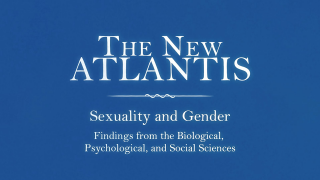New study challenges claims about human sexuality

A new study by outstanding scholars has been published that challenges some widely-believed claims about human sexuality.
Dr Lawrence S. Mayer, an epidemiologist trained in psychiatry, and Dr Paul R. McHugh, described by The New Atlantis journal as "arguably the most important American psychiatrist of the last half-century", have produced Sexuality and Gender: Findings from the Biological, Psychological and Social Sciences. The study explores sexual orientation, gender identity, and mental health and well-being.
Chief among the findings is that contrary to popular belief, the claim that sexual orientation and gender identity are innate is insupportable.
No evidence that sexual orientation innate
The first part of the study, which focuses on sexual orientation, concludes that the claim that sexual orientation is "an innate, biologically fixed property of human beings" is not supported by scientific evidence.
Noting studies that have found some differences in the brains of "homosexuals and heterosexuals", Dr Mayer and Dr McHugh argue that these "have not demonstrated that these differences are inborn rather than the result of environmental factors that influenced both psychological and neurobiological traits."
They cite the work of neuroscientist Simon LeVay, whose work in 1991 showed brain differences in homosexual men compared to heterosexual men. Some years after the study, LeVay explained:
"It's important to stress what I didn't find. I did not prove that homosexuality is genetic, or find a genetic cause for being gay. I didn't show that gay men are 'born that way,' the most common mistake people make in interpreting my work. Nor did I locate a gay center in the brain." (David Nimmons, “Sex and the Brain,” Discover, March 1, 1994)
Higher rates of childhood abuse
The study found that there was some correlation between childhood abuse and later same-sex attraction, with those identifying as homosexual found to be two to three times more likely to have experienced childhood sexual abuse than heterosexuals.
Higher rates of mental health problems
The second section focuses on mental health amongst the LGBT community.
In their summary of the findings, Dr Mayer and Dr McHugh state:
"Compared to the general population, non-heterosexual and transgender subpopulations have higher rates of mental health problems such as anxiety, depression, and suicide, as well as behavioral and social problems such as substance abuse and intimate partner violence.
"Studies show that while social stressors do contribute to the increased risk of poor mental health outcomes for these populations, they likely do not account for the entire disparity."
Gender dysphoria
The final section discusses gender identity, including gender dysphoria (transgenderism).
In this section Dr Mayer and Dr McHugh write:
"Gender dysphoria — a sense of incongruence between one's biological sex and one's gender, accompanied by clinically significant distress or impairment — is sometimes treated in adults by hormones or surgery, but there is little scientific evidence that these therapeutic interventions have psychological benefits.
"Science has shown that gender identity issues in children usually do not persist into adolescence or adulthood, and there is little scientific evidence for the therapeutic value of puberty-delaying treatments.
"We are concerned by the increasing tendency toward encouraging children with gender identity issues to transition to their preferred gender through medical and then surgical procedures. There is a clear need for more research in these areas."
'Serious error which flies in the face of scientific evidence'
Dr Ian Paul of the Psephizo blog offers a helpful commentary on the study, and discusses the implications of the findings on current discussions within the church to endorse same-sex 'marriage'.
"For those involved in current debates in the Church of England, one of the most striking things about this report is that it contradicts the assertions frequently made in the discussions as part of the case for a change in the Church's teaching," he writes.
He highlights how arguments made by Loveday Alexander, Alan Wilson and Andrew Davidson have offered statements "which ignore, disguise or set aside the research consensus in this area—in order to bolster the case for change in the Church's teaching."
Ian Paul concludes:
"Even before we consider the alarming rates of promiscuity amongst male same-sex couples, and the consequent extraordinarily high levels of sexually-transmitted diseases in the community, the evidence undermines any claim that 'marriage is marriage' and that same-sex sexual relations are in essence the same as other-sex relations.
"The wide-ranging evidence shows that there is a pathology to same-sex relations which is quite different from patterns in other-sex relations (without pretending that the latter are without their own problems!)
"Even setting aside the concerns of theology, of the Church's tradition, and the consistent teaching of Scripture, for the Church to head down a route of viewing same-sex marriage and relationships as parallel with or equivalent to 'traditional' marriage would be a serious error which flies in the face of the scientific evidence."
Related links:
The New Atlantis: Special Report - Sexuality and Gender (The New Atlantis)
What does science say about sexuality? (Psephizo)
